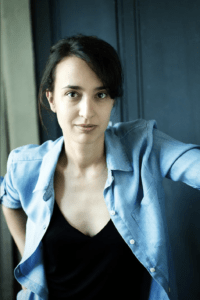
“My first exposure to theater was experiencing a children’s version of The Magic Flute. My mum was an opera fan, and she made us listen to it at home, so we knew the story.” In Germany and Switzerland where Martina Potratz grew up, getting into a government funded ensemble was the conventional path for the acting graduate.
But after obtaining a two-year internship at New York’s Wooster Group, where she was able to watch their entire video archive, she became part of the downtown theater scene, right at the beginning of The Bushwick Starr. “My first years in New York opened my horizons.”
“I realized there was a more spontaneous way to do theater – it felt daring. I was shocked that I changed my goal… I didn’t know these questions existed before!”
Life in the theater has been a bumpy road for the Swiss-born actress. At first juggling coffee shop jobs, and producing plays in her apartment, asking for donations beer-or-bucket style. “It was so low budget we even made our money back.” But eventually this lifestyle started to feel scattered: “There wasn’t a lot of work, people left town. The only way this was going to work is if I wrote it.” Out of necessity, the immigrant theater-maker became a playwright.
As somebody who knew Ms. Potratz as a colleague from our work in corporations with women in the workplace, I was intrigued when I came across some thoughtful content on social media for the fundraising campaign of an interactive play. Since I couldn’t attend the show in person, I decided to make a contribution (through Seed & Spark, a distribution and fundraising platform for indie films). As a reward, I get to “Attend my Dream Party: think of the most infamous or raucous or week-long affair you missed…”
Mrs Potratz said she enjoyed creating a world in the campaign, sharing her research for the play and forcing her to grow her audience beyond the conventional ticket-selling paradigm.
But beyond that, she enjoyed being put in touch with other people who are innovating with theatrical performance: “You write the rules as you go. People already figured out some of the elements such as insurance for a site specific production, so it creates deeper connections and you learn a lot in the process. It’s about figuring out something you haven’t done before.”
When I started asking questions about her play ‘In the Blue Hour’ being produced June 14-17, 2018, I realized it was so much more than devised theater. In fact, it is not devised theater, but rather a non-linear play structured in a framework made up of four scenes with clear topics, and pockets built in for improvisation with the audience – immersive theater. That means if you are one of the fifteen lucky able to attend the play premiere at La Maison D’Art in Harlem, you are required to fill in a questionnaire at the time you purchase your ticket, and expected to be fully present as you literally become embedded in the story of the play for that evening. Portraz cites María Irene Fornés as an influence for creating site-specific non-linear plays in the 70’s.
Working with actors who are able to improvise part of her script and organically follow through a scene, ‘embedding the audience’ around the narrative of the play is her invention.
“When people read the script, they say it’s very European. What does that even mean?” Potratz’ production company being called ‘Lil’ Explosions’ summarizes what I expect the play to feel like: subtle, intense, unexpected, perhaps with a casual elegance, and my guess is no one dies at the end. Or maybe they… do. It’s hard to say: you would have to be there! “The play is meant to ask what is important to you in life, to make you part of the memories.”
Melissa Crespo, her director and some of the actors (Kathryn Rossetter, Spencer Scott Barros, Rosie Sowa, Brittany Bellizeare, John Stewart and Herbert Sigmund Go) are long time collaborators. Attending the play includes partaking in a full dinner party, with video projection elements. And there is not a clear ending, so that the conversation continues among audience members and players into the evening. Potratz describes her experience producing as an extension of the writing process. “I’m really careful not to walk on the director’s toes,” and “I didn’t want to play one of the characters, that would have been too much.” So then I found out… “I’m the resident chef, I will be serving food!”
At the end of our midtown mid-day meeting, Martina didn’t want a drink, and she had more personal news to share: “It’s an exciting time to make a play, then make a person.” Mrs. Martina Potratz fully embodies feminine creativity.
What’s the future of the play? Her director is into an off-Broadway run, Potratz is also thinking about European festivals or co-productions to help bring her vision to life again: “I’m okay with walking one step at a time.”
Essay by Flo Ankah
➤ Making discoveries:
Can you describe an experience in life where you realized that there was more to play with that you knew possible at the time?


